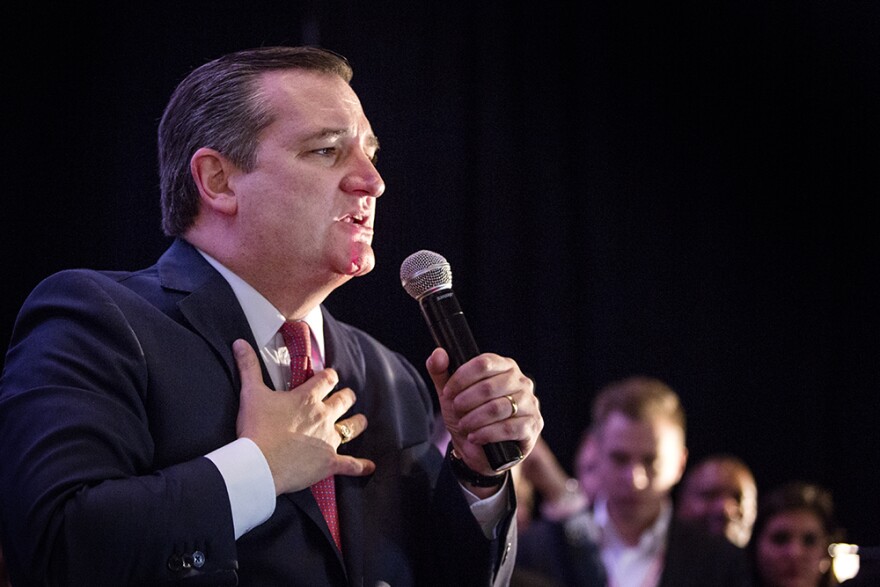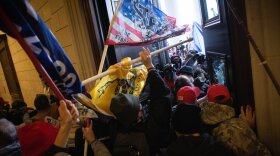In the wake of the Jan. 6 Capitol riot, Texas Republican Sen. Ted Cruz has received calls to resign and ethics complaints from Democratic Senate colleagues.
Cruz, a lawyer, is also getting blowback from members of the legal community.
Lawyers and law students are seeking to disbar him with a set of grievances filed Thursday with the State Bar of Texas. They say Cruz and Missouri Senator Josh Hawley made false statements about the 2020 election, violating the ethical standards of the profession.
“We couldn’t stand by and stay silent while some of the most prominent members of our profession are eroding the institutions, the rules and the principles that we joined this profession to defend,” said Ramis Wadood, a third-year student at Yale Law School.
Wadood is one of the drafters of a petition that circulated soon after the Capitol attack. It accumulated almost 11,000 signatures. The group then expanded on their arguments in a letter to the State Bar of Texas.
Cruz and Hawley both encouraged supporters of former President Trump to believe the 2020 election was fraudulent, without evidence and against the findings of several courts. They objected to electors from Arizona and Pennsylvania, states where judges had already ruled against lawsuits challenging ballots.
Wadood and others say Cruz undermined a free and fair election. Is what he did a violation of the ethical code of lawyers?
The Ethical Code
According to the Texas Disciplinary Rules of Professional Conduct, and the American Bar Association Model Rules, lawyers shouldn’t be dishonest or misrepresent things.
And being technically correct doesn’t count.
“Omissions and half-truths still are lies in the eyes of the Model Rules,” said Jessica Dixon Weaver, a professor at Southern Methodist University’s Dedman School of Law.
Dixon Weaver pointed out the rules also say attorneys are guardians of the law and play a role in the preservation of society. And they don’t only deal with the attorney-client relationship.
“It’s our professional conduct as lawyers and also our conduct in our personal lives,” she said.
Dixon Weaver isn’t sure the petitioners will succeed, however. She says to make their case, those filing grievances need to argue that precise words and actions Cruz used violated specific conduct rules.
The letter — also signed by about 200 members of the Texas bar — expands on the arguments made in the petition, quoting Cruz and citing laws and Bar rules he allegedly violated.
The Process
After a grievance is filed, the Office of the Texas Bar’s Chief Disciplinary Counsel will decide if it gets elevated to a “complaint,” and then decide if the complaint has just cause. If so, the lawyer in question is notified and there’s a legal proceeding. Cruz would be able to choose which process he wants: an evidentiary panel or district court hearing.
The people who decide guilt are volunteer lawyers and members of the public, although each process could terminate in an appeal heard by the Texas Supreme Court.
The Debate
Attorney Gaines West served on the state Grievance Oversight Committee and Board of Disciplinary Appeals. He handles ethics cases in private practice, and is skeptical the grievances against Cruz will get very far.
“As a political actor, he would have free speech as well as political speech rights,” West said. “He may even have some immunity dealing with his actions as a representative.”
Article 1 Section 6 of the Constitution contains the “speech and debate” clause, which says “for any Speech or Debate in either House, they shall not be questioned in any other Place.” ‘They’ refers to members of Congress.
"We think that there is plenty of evidence off of the Senate floor that leads to them having violated the Rules of Professional Conduct," Wadood said.
West sees the effort against Cruz as political, calling it “retribution against a United States senator for taking a position they disagreed with.”
Cruz’s senate office didn’t respond to an email seeking comment.
Soon after the Jan. 6, riot, Cruz said on KHOU he didn’t bear any responsibility for escalating a situation that ended in violence.
“What I was doing and what the other senators were doing is what we were elected to do,” he said. “Which is debating matters of great import in the chamber of the United States Senate.”
Neil Siegel, a law professor at Duke University, said the expectation for lawyers to uphold the rule of law shouldn’t be lowered because the lawyer in question is also a politician.
“That’s the real risk,” he said. “That lawyers get off the hook for behaving in ways that are inconsistent, not just with the oath they took, but with their professional responsibility as lawyers just because they’re acting as politicians, as if that excuses, let alone justifies their behavior.”
Siegel said the more lawyers mislead and stretch the truth, the more public faith in the law is undermined.
“If there’s no respect for truth on the part of those who are lawyers or judges, then it becomes harder and harder to persuade people they ought to put up with outcomes that they don’t care for,” he said.
A Self-Regulating Profession
The Texas Bar is a quasi-state agency and manages the grievance process, although ultimately, the legal profession regulates itself.
“It does take, you know, the body of our profession to support the person who is either whistleblowing or calling the person to the carpet,” Dixon Weaver said. “And sometimes that doesn’t happen.”
It would be months before we find out if anything does happen. In an email, the State Bar of Texas said it’s prohibited from disclosing any pending grievances, and dismissed grievances aren’t made public.
Copyright 2021 KERA





